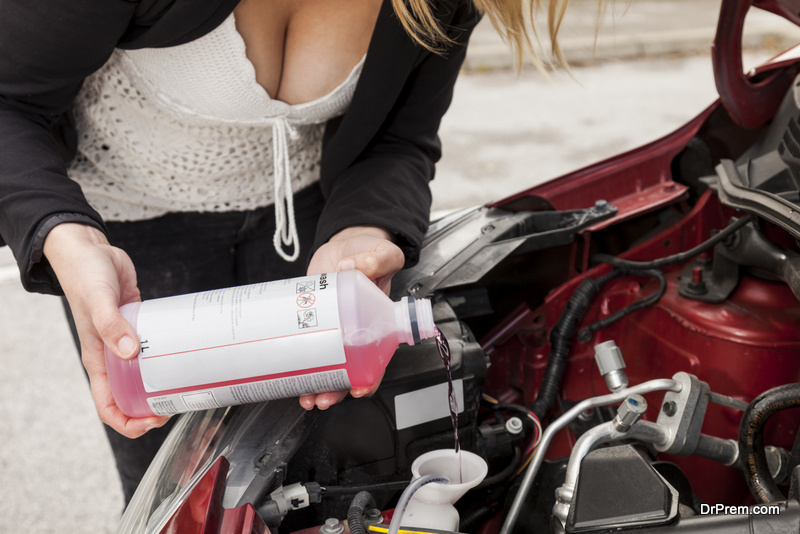Road vehicles are inherently not very eco-friendly. The fact is, before cars are ever even sold and on the road, they consume a lot of energy, largely because they leave a huge footprint across several industries, from steel to glass to paint and plastic. And their environmental impact once they’re actually on the road is staggering: from air pollution to toxic batteries and plastics, your car is likely not very friendly to the Earth. Fortunately, there are some things you can do to combat this:
Keep Your Car Light
 Cleaning your car regularly to keep it light is actually a good way to contribute to the environment. This is because the heavier a car is, the more fuel it takes. When you drive from place to place with heavy objects in your car, like sports equipment, coolers, suitcases, etc., it weighs the car down and gives your vehicle worse gas mileage. And when your car has bad gas mileage, you need to continue filling it which, as you know, has a negative impact on the environment.
Cleaning your car regularly to keep it light is actually a good way to contribute to the environment. This is because the heavier a car is, the more fuel it takes. When you drive from place to place with heavy objects in your car, like sports equipment, coolers, suitcases, etc., it weighs the car down and gives your vehicle worse gas mileage. And when your car has bad gas mileage, you need to continue filling it which, as you know, has a negative impact on the environment.
Let Air Flow Naturally
When it comes to fuel efficiency, the air conditioner in your car is its worst enemy. According to Natural Resources Canada, using the AC can increase fuel consumption by as much as 20%. With that in mind, it’s clear that the air conditioner takes up more fuel and energy than any other auxiliary power requirement.
Currently, more car manufacturers are taking a step back and looking at inventive ways to reduce the way the AC impacts a car’s fuel consumption. For now, there are some things you can do on your own. Rolling down your windows is certainly better than putting on the AC, especially if you’re driving on the highway and the wind serves the same purpose, but it’s not the ideal situation.
Similarly, because the air that gets into your car makes it less aerodynamic, it also has a negative impact on fuel efficiency. In a perfect situation, you would use the car’s flow through ventilation system while keeping the windows closed, which allows air from outside to flow in naturally through the car.
Buy a Efficient Model
 One of the best ways to be eco-friendly about your car is to choose one that’s known for having features that make it efficient. Obviously, you may not have the money on hand to go out and buy a car that doesn’t have such a harsh impact on the environment. However, you can keep it in mind for a future purchase, or trade your current car in for a more eco-friendly model.
One of the best ways to be eco-friendly about your car is to choose one that’s known for having features that make it efficient. Obviously, you may not have the money on hand to go out and buy a car that doesn’t have such a harsh impact on the environment. However, you can keep it in mind for a future purchase, or trade your current car in for a more eco-friendly model.
Get Your Car Off the Road
If you currently drive a car that’s very bad for the environment, consider donating it or taking it to the junkyard. You can even sell a non running car, too. When you donate your car, not only will you get a tax deduction, but it will help your local community.
For example, Wheels for Wishes accepts donated cars and uses funds from the parts to support local children and the Make a Wish Foundation. They’ll even pick up the vehicle for you. On the other hand, junkyards take vehicles that aren’t very fuel efficient and have a reputation for their harsh effect on the environment, usually don’t put those cars back on the road.
Use Vegetable Oil
 It may sound too good to be true, but it isn’t. When you convert your car to run on vegetable oil, it’s not only environmentally friendly, but economically friendly as well. Any vehicle with a diesel engine can be run on vegetable oil. To help you understand how it works, it helps to get a bit of history.
It may sound too good to be true, but it isn’t. When you convert your car to run on vegetable oil, it’s not only environmentally friendly, but economically friendly as well. Any vehicle with a diesel engine can be run on vegetable oil. To help you understand how it works, it helps to get a bit of history.
Rudolf Diesel, the German inventor who designed the diesel engine, actually designed the engine specifically to run on vegetable oil he grew on his farm in Iowa. This technology was invented to combat staggering gas prices at the time. Therefore, the technology behind the diesel engine was always there, but later ignored.
However, buying oil from the supermarket actually turns out to be more expensive per gallon when you break the numbers down. For this reason, making the decision to use vegetable oil is a commitment, as you have to source your vegetable oil for free from local businesses. Because you have to dispose of oil in a certain way, nearly every restaurant and bar pays a company to properly dispose of it. You can use this to your advantage. Simply head over to a local restaurant and request to take some of their non-hydrogenated oil off their hands.
You’re in charge of bringing the collection barrel to take the oil. You should build a solid relationship with the store owner, which allows you to come at collect oil for your car regularly.
Article Submitted By Community Writer




